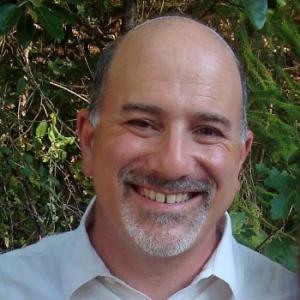 In Parashat Tol’dot, Isaac is described as having “weak eyes,” which is considered a metaphor for his inability to see what his twin sons, Jacob and Esau, needed from him (Gen. 27:1). Why was he so poorly prepared to father his boys? In this midrashic monologue, Isaac gives us a clue as he reflects upon his relationship with his own father. Imagine if these were Isaac’s thoughts:
In Parashat Tol’dot, Isaac is described as having “weak eyes,” which is considered a metaphor for his inability to see what his twin sons, Jacob and Esau, needed from him (Gen. 27:1). Why was he so poorly prepared to father his boys? In this midrashic monologue, Isaac gives us a clue as he reflects upon his relationship with his own father. Imagine if these were Isaac’s thoughts:
"I was so excited when Dad told me that we were going mountain climbing!
"My dad, Abraham, was a macher (a very important person), always talking incessantly with Adonai. He planned to be the father of many peoples whose names would be a blessing.
"I didn’t care about any of that. As his teenage son, supposedly his favorite, the one he said he loved, I just craved time with my dad.
"You would think that a guy who spent his days making holy connections with people would do the same with his own family. But we weren’t really close, maybe because he had me so late in life.
"When I got frustrated about Dad’s inattention, my mom, Sarah, assured me that he loved me, but that he was driven to succeed. Most men, she explained, found their identity and self-worth through their work. To be honest, I sometimes felt Dad used work to avoid me because he did not know how to deal with me or show emotion or talk about personal stuff.
"When Dad finally focused on our wilderness trip, he woke up early, saddled the donkey himself, and even gathered all the firewood and tools. That was so out of character for him. We had servants. For a wealthy man to engage in such menial tasks meant that he was filled with anticipation (Midrash Tanchuma, Vayeira 22:4). I hoped it meant that my father really wanted to spend time with me.
"We set out pretty early. When Mom did not come to see us off, I knew that something was up. To this day, I am not sure if Mom knew then what Dad was planning, or if she just found out later.
"Mom died before we returned. Did she die of a broken heart after hearing what Dad almost did to me (see Ruth H. Sohn, “Post-Biblical Interpretations,” The Torah: A Women’s Commentary)? Or was it because after years of partnership, Dad made a major family decision without even talking with her (Zohar on Vayeira)? If Mom hadn’t died, would their marriage have even survived? God, I miss her ...
"Dad told me that we would be offering a sacrifice to Adonai. He had never let me participate before. Why wasn’t I good enough to help? Now, I couldn’t contain my excitement. My first sacrifice, a Shehecheyanu moment!
"I kept a journal of the trip. I wrote: V’yeilchu sh’neihem yachdav. And the two of them—well, us—went on together (Gen. 22:6). I tried to engage Dad in conversation.
"I said, 'Dad?' 'Yes, my son,' he answered distantly. I asked, 'Here is the wood, and the knife, but where is the lamb for the burnt offering?' At first, he was silent; eyes distant. Then he answered quietly, 'God will see to the sheep for the offering, my son (Gen 22:7-8).' Even today those words haunt me; was he hinting that 'my son'—me—was to be the sacrifice in his holy work (Midrash Tanchuma, Gen. 22:3)?
"Those were the only words we spoke. I wrote again, “The two of them went on together” (Gen. 22:8).
"My wife Rebekah laughed at how ironic that was. 'You two walked together? You make it seem that words were unnecessary because you two were close. But, as you have told me time and again, when Abraham was there, his mind was elsewhere. Even when walking with him, you felt alone.'
"How can I explain what happened on the mountain? I was exhausted from the hike. He wrapped me in a blanket and laid me down. I dozed fitfully.
"Once again, nothing was turning out as I had hoped. Dad built the altar himself. He didn’t ask for my help. I felt straitjacketed, like his inability to reach out to me was tying me up, holding me down. His interminable silences—the fact that he didn’t really see me—sliced through my heart like a knife.
"Maybe my dad really didn’t mean to hurt me. Maybe he was just trying to do what he thought dads were supposed to do: Be strong. Be the breadwinner. Maybe all that pressure somehow overloaded him, making him distant. All I remember is hurting inside.
"I had hoped that this trip would change things. That he would bring me up to introduce me to Adonai so we could offer the sacrifice together. Instead, I was the sacrifice. My dad sacrificed our time together. When by himself he drew the knife across the ram’s throat, it felt as if he severed the thin bonds of our relationship.
"Abraham called that place Adonai-yireh, meaning 'on the mount of Adonai, there is vision' (Gen. 22:14). Yeah, that day my vision was crystal clear: I couldn’t forgive his inattention. Our relationship had to end. I had to break it off.
"That day, Abraham departed with his servants for Beersheba. He was praised worldwide for his unswerving faith. His name became a blessing. Thanks to his grandson Jacob, Abraham’s descendants were as numerous as the stars in the heavens and the sands on the seashore.
"But I left separately.
"I never talked to my dad again. The next time I saw him was at his funeral (Gen. 25:9).
"Sometimes I am so mad, and sad, that I can’t see straight. He left me so ill-equipped to handle my own sons. I never really had a good parental role model.
"Why is it that relationships between fathers and sons (and parents and children generally)—which should be so close—sometimes can be so distant and painful?
"Maybe we learned it all from Father Abraham."
Rabbi Paul Kipnes, MAJE, a popular lecturer on raising spiritually balanced, emotionally whole children, is leader of Congregation Or Ami in Calabasas, CA. A former camp director and North American Federation of Temple Youth (NFTY) regional advisor, Rabbi Kipnes and his wife Michelle November, MSSW, co-wrote Jewish Spiritual Parenting: Wisdom, Activities, Rituals, and Prayers for Raising Children with Spiritual Balance and Emotional Wholeness (Jewish Lights Publishing).
 In our Torah portion this week, Tol’dot, we learn that “Isaac had grown old and his eyesight had dimmed” (Gen. 27:1) compromising his ability to differentiate between his two sons. Does this explain how he, “inadvertently” blesses Jacob instead of Esau? And Esau, (in perhaps atypically male way) cries out to his father who loved him so, “Bless me! Me too, Father!” (Gen. 27:38). Perhaps this dimness of eyes is a perpetuation of the distance between fathers and sons in their relationships that Rabbi Kipnes so aptly describes. Perhaps the PTSD and the trauma of the Akeidah never leave Isaac, and are passed down through the “generations,” tol’dot. Perhaps Isaac learned this distancing from his father, Abraham, and so we see it in Isaac’s interactions with his children.
In our Torah portion this week, Tol’dot, we learn that “Isaac had grown old and his eyesight had dimmed” (Gen. 27:1) compromising his ability to differentiate between his two sons. Does this explain how he, “inadvertently” blesses Jacob instead of Esau? And Esau, (in perhaps atypically male way) cries out to his father who loved him so, “Bless me! Me too, Father!” (Gen. 27:38). Perhaps this dimness of eyes is a perpetuation of the distance between fathers and sons in their relationships that Rabbi Kipnes so aptly describes. Perhaps the PTSD and the trauma of the Akeidah never leave Isaac, and are passed down through the “generations,” tol’dot. Perhaps Isaac learned this distancing from his father, Abraham, and so we see it in Isaac’s interactions with his children.
Rashi suggests that Isaac’s eyes were dim as a result of the ministering angels weeping at the moment of the Akeidah (Rashi on Gen. 27:1). Yet, in reading Rabbi Kipnes’ gorgeous midrash, his understanding of how Isaac came to be Isaac, and the challenges of fathers passing on pain to their sons, I was called to think about the vision and wisdom of others in his orbit, in his life. Most particularly, I thought of the woman from whom we might imagine that he seeks comfort after the death of his mother.
In Chayei Sarah, we learn that after the death of Abraham, Isaac settled near Be’er-lachai-roi (Gen. 25:11), the place where Hagar, his father’s lover (likely twice) experiences divine presence (Gen. 16:13-14). Based on B’reishit Rabbah, Rashi teaches that it is in this place where God sees Hagar that she sees and names God El Ro’i (meaning, the One who looks upon me!). It is a place where God recognizes the downtrodden, a place for prayer.
Can we imagine that as Isaac suffered from the distancing of his father, he also was influenced by others in his life—most profoundly perhaps by the mother of his half-brother? Hagar understood firsthand that God heard and saw and responded to the needs of the underserved. She understood that God provides for all of us a sense of love and engagement, and that in the shadow and dimness of paternal love lost, love might be found elsewhere. As the mother of one who God hears, Yishmael, Hagar models for Isaac the notion that for Esau there indeed might be other blessings. Our love and God’s love are not finite: as we give love away there is the infinite potential for more.
In the broad spectrum of family configurations that endow our own families today, Torah reminds us that even in places of trauma and distant relationships between fathers and sons, there are others full of wisdom and spiritual presence whom (we pray) might fill the void.
Kein y’hi ratzon!
(Postscript: This article was written prior to the trajedy in Pittsburgh. In the days following that disaster, at vigils held across the continent, many of us have been fortunate to experience the caring support of neighbors, friends, and community, all offiering their wisdom and spiritual presence as a way to help us cope.)
Rabbi Ilene Harkavy Haigh is the rabbi at The Woodstock Area Jewish Community—Congregation Shir Shalom in Woodstock, VT.
Tol’dot, Genesis 25:19−28:9
The Torah: A Modern Commentary, pp. 173–189; Revised Edition, pp. 172–189
The Torah: A Women’s Commentary, pp. 133–156
Haftarah, Malachi 1:1–2:7
The Torah: A Modern Commentary, pp. 341−343; Revised Edition, pp. 191−193;
Explore Jewish Life and Get Inspired
Subscribe for Emails


